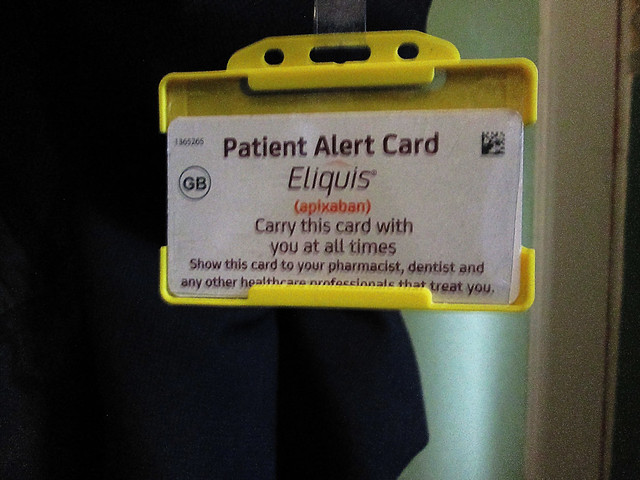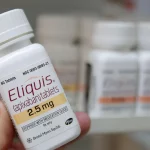Eliquis Side Effects In The Elderly

As you age, even though you may have taken a medication for decades, your body may react differently to it later in life. One reason for this is that your metabolism has slowed down. Some medicines need to be processed by your liver to benefit your health; slower digestion and liver function mean it may take longer for a drug to get into your bloodstream. Later, remnants of the medicine need to be eliminated from your body by the liver and kidneys. Slowdowns at this stage mean it may take longer for a drug to leave your body, so its effect lasts longer.
Studies also show that certain medications are less safe for older people, and it is important that you work with your provider or pharmacist to use medications that are safe for your age. The American Geriatrics Society’s Beers Criteria lists medications that may not be safe in older people and can be used as a tool when you talk with your provider or pharmacist about using safe medications.
The incidence of atrial fibrillation increases with age. The risk of stroke is increased four- to five-fold in old patients with atrial fibrillation. In another study, 23.5% of strokes in patients aged 80 and older were attributable to atrial fibrillation. Advanced age is also associated with a progressive increase in the risk of major bleeding in subjects ≥85 years, particularly if treated by oral anticoagulants.
What is Eliquis?
Eliquis is a brand-name prescription drug containing the active ingredient drug apixaban. It’s FDA-approved to treat and prevent dangerous blood clots that can block blood vessels in your body. It’s also called an anticoagulant. The process of blood clotting is called coagulation. Anticoagulants such as Eliquis make your blood less able to form clots.
Specifically, Eliquis is approved for use in adults to:
• Prevent blood clots and stroke in people with nonvalvular atrial fibrillation (AFib). Nonvalvular AFib is a type of irregular heartbeat that’s not caused by a heart valve problem. With this condition, you have a raised risk of blood clots forming in your heart.
• Treat deep vein thrombosis (DVT). A DVT is a blood clot that forms in a vein deep inside your body. DVTs most commonly occur in a vein in your leg, but they can also occur in your arm.
• Treat pulmonary embolism (PE). A PE is a blood clot that blocks blood flow to your lungs. It usually occurs when a DVT gets dislodged and travels through your veins to your lungs.
• Prevent DVT or PE from recurring. After you’ve had initial treatment for a DVT or PE, Eliquis helps prevent blood clots from occurring again.
• Prevent DVT that could lead to PE in people who’ve had hip or knee replacement surgery. These surgeries raise your risk of getting these types of blood clots.
How is Eliquis taken?
Eliquis comes as a tablet that you take by mouth. It’s available in two strengths: 2.5 milligrams (mg) and 5mg. The recommended dosages is as follows:
Nonvalvular atrial fibrillation: The dose of Eliquis (apixaban) is usually 5 mg by mouth twice daily. There are some people who will only take 2.5 mg by mouth twice daily.
Blood clot prevention after surgery: The dose of Eliquis (apixaban) is usually 2.5 mg by mouth twice daily. Blood clot and pulmonary embolism treatment: The dose of Eliquis (apixaban) starts at 10 mg by mouth twice daily for the first 7 days, then the dose is lowered to 5 mg by mouth twice daily.
Blood clot prevention for those with a history of blood clots: The dose of Eliquis (apixaban) is usually 2.5 mg by mouth twice daily after at least 6 months of treatment for blood clots or pulmonary embolism.

Eliquis Side Effects In The Elderly
A recent study suggests that Eliquis (Apixaban) appears to provide the best combination of efficacy and safety in the elderly. However, older people may have more Eliquis in their bodies over a longer period. And this may increase their risk for side effects,
Eliquis can cause side effects, and some of these side effects may be more common or severe in elderly patients. Some of the possible side effects of Eliquis in the elderly include:
1. Bleeding: One of the main side effects of Eliquis is bleeding, which can occur in any part of the body. Elderly patients may be at an increased risk of bleeding due to age-related changes in the body and other medical conditions.
2. Bruising: Eliquis can also cause bruising, which may be more common in elderly patients due to thinner skin and weaker blood vessels.
3. Fatigue: Some elderly patients may experience fatigue or weakness while taking Eliquis, which may be a side effect of the medication or related to other medical conditions.
4. Dizziness: Eliquis can cause dizziness or lightheadedness, which may be more common in elderly patients who may be more susceptible to falls.
5. Headache: Headache is a less common side effect of Eliquis, but it can occur in some elderly patients.
It’s important to note that not all elderly patients will experience these side effects, and some may experience other side effects not listed here. If you are an elderly patient taking Eliquis and experience any unusual symptoms or side effects, you should contact your doctor or healthcare provider immediately for further evaluation and treatment.
Eliquis is considered a high-alert medicine, which means that it’s safe as long as it’s taken correctly. If mistreated, it can lead to many serious health risks, including stroke and severe bleeding. Therefore, people especially the elderly need to be extremely cautious when taking Eliquis.
Black Box Warnings
The FDA required the manufacturers to add two black box warnings to the medication’s packaging. The first cited an increased risk of spinal or epidural blood clots in patients who undergo procedures that inject certain medicines into those regions of the body. The warning states that the clots can potentially cause long-term or permanent paralysis.
The second warning advises patients that stopping Eliquis may result in an increased risk of blood clots, stroke, or pulmonary embolism. The warning recommends doctors consider another anticoagulant treatment if they take a patient off apixaban before treatment is completed for any reason other than “pathological bleeding.”





